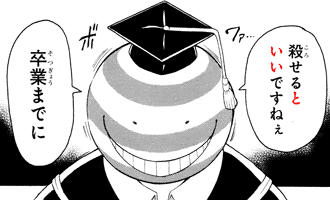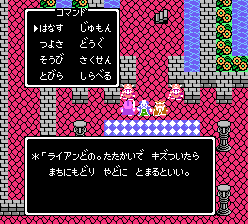Don't mistake this for to iimasu といいます, which means "[something] is called [something]," or "my name is [something]."
In particular, if to ii repeated, then it's likely __ to ii __ to ii ~と言い~と言い instead.
Manga: Assassination Classroom, Ansatsu Kyoushitsu 暗殺教室 (Chapter 1, 暗殺の時間)
Grammar
Basically, whatever comes before the conditional particle to と is the condition: it's what needs to be true. And if it's true, then it's "good," it's ii いい.- yuushou suru to ii
優勝するといい
If victorious: good.
In English, we'd naturally translate this with an "would be." For example:
- It would be good if victorious.
- It would be good if you won.
In a way, it can be similar to how -te-yokatta ~てよかった works. The word yokatta, meaning "was good," is the past form of ii. When -te-yokatta shows up, sometimes it's a regretful way to refer to a hypothetical scenario that didn't happen, but would have been good if it had happened.
- yuushou shite yokatta
優勝してよかった- It's good thing I won. (because I did win.)
- It would have been good if I had won. (but unfortunately I didn't win.)
When to ii is used after a verb, it can be interpreted in two ways depending on context:
- The speaker is simply stating what he wishes would happen.
- The speaker is advising someone that if they did something that would be good.
The pattern to ii can also be used with i-adjectives. For example:
- tanoshii to ii
楽しいといい
If fun: good.
With na-adjectives and nouns, the predicative copula da だ is used before to と.
- shiawase na jinsei
幸せな人生
Happy life.- shiawase - a na-adjective.
- shiawase na jinsei da to ii
幸せな人生だといい
If is happy life: good.
It would be good if it were a happy life.
It would be good if [he led] a happy life.- jinsei 人生
Life. (noun.)
- jinsei 人生
- shiawase da to ii
幸せだといい
If is happy: good.
It would be good if it were happy.
It would be good if [he] were happy.
Beware that when to ii といい comes right after a noun without the copula, it's the nominal conjugation (ren'youkei form) of the verb iu いう, "to say," coming after the quoting particle to と, not the conditional to と. For example:
- kore ga jinsei to ii
これが人生といい
Calling this "life." (i.e. this is called life.)
(act of) calling this "life." - Tanaka to iimasu
田中といいます
[I'm] Tanaka.
[I'm] called Tanaka.- iimasu いいます
Polite form of iu いう, which is the masu suffix attached to the ren'youkei.
- iimasu いいます
da to ii na だといいな
The phrase da to ii na だといいな is sometimes used as an expression to say "it would be good if that happened," or "I wish that would be the case," or something like that.Literally, it's the predicative copula da だ, plus the conditional particle to と, plus the i-adjective ii いい, plus the sentence-ending particle na な. We've already covered the first three things in this article, so what's important is this na な.
This particle has the nuance of "I think?" It's used when the speaker is expressing his opinion or conclusion about something.
This is slightly different from saying da to ii ne だといいね. Although similar to na な, the ne ね particle is more strongly about asking for agreement of the listener.
One difference is that you may see da to ii na written in thought bubbles, when a character is thinking alone about something that would be good, but da to ii ne requires a listener.
- da to ii na
どといいな
[That'd be] good, I think.- I hope you agree with me.
- da to ii ne
だといいね
[That'd be] good, wouldn't it?- Come on, nod or something!
Examples
殺せるといいですねぇ
Manga: Assassination Classroom, Ansatsu Kyoushitsu 暗殺教室 (Chapter 1, 暗殺の時間)
- Context: a tentacle monster destroys the moon and will destroy the Earth next year unless his class of assassin students manage to kill him before then.
- koroseru to ii desu nee
殺せるといいですねぇ
If able to kill: good.- It would be good if you managed to kill me, don't you think?
- koroseru 殺せる
Able to kill.
(potential form of...) - korosu 殺す
To kill.
- sotsugyou made ni
卒業までに
Until graduation. (i.e. within one year.)- See also: dislocation.
宿に泊まるといい
Game: Dragon Quest IV, Doragon Kuesto Foo ドラゴンクエストIV
- Raian-dono. tatakai de kizu tsuitara
machi ni modori yado ni tomaru to ii.
「ライアンどの。たたかいで キズついたら
まちにもどり やどに とまるといい。
Ryan-dono, if [you] get injured in battle
it's good if [you] return to town and stay at an inn.- In classic JRPGs, sleeping at an inn heals injuries. So it's good for you to go there and get the damage healed.


No comments: